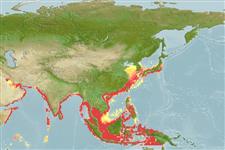Classification / Names
Common names from other countries
Main reference
Size / Weight / Age
Max length : 60.0 cm SL male/unsexed; (Ref. 9811); common length : 30.0 cm SL male/unsexed; (Ref. 9811)
Length at first maturity
Lm ?, range 18 - ? cm
Environment
Marine; benthopelagic; oceanodromous (Ref. 51243); depth range 5 - 110 m (Ref. 12260)
Climate / Range
Subtropical, preferred 25°C (Ref. 107945); 46°N - 10°S, 47°E - 142°E
Distribution
Indo-West Pacific: Persian Gulf to Indonesia, north to Hokkaido, Japan. Extralimital captures have been made from the Adriatic and off Hawaii. Not recorded from Australasia. Northeastern Atlantic: 3 reports of capture reported from this area (Ref. 86350).
Countries | FAO areas | Ecosystems | Occurrences | Introductions
Short description
Dorsal
spines
(total): 0;
Dorsal
soft rays
(total): 37-43;
Vertebrae: 34 - 37. Body firm, very deep, oval, and compressed. Operculum absent; gill opening reduced to a vertical slit on the side of the body; gill membrane broadly united to isthmus. Dorsal and anal fins preceded by a series of 5 to 10 blade-like spines with anterior and posterior points. Pelvic fins absent. Caudal fin deeply forked, the lower lobe longer than the upper. Color is gray above grading to silvery white towards the belly, with small black dots all over the body. Fins are faintly yellow; vertical fins with dark edges.
IUCN Red List Status (Ref. 115185)
Threat to humans
Harmless
Human uses
Fisheries: highly commercial
Tools
Special reports
Download XML
Internet sources
Estimates of some properties based on models
Phylogenetic diversity index
PD50 = 0.5313 many relatives (e.g. carps) 0.5 - 2.0 few relatives (e.g. lungfishes)
Trophic Level
3.3 ±0.1 se; Based on diet studies.
Resilience
Medium, minimum population doubling time 1.4 - 4.4 years (K=0.24-0.26; tmax=7)
Vulnerability
Low to moderate vulnerability (33 of 100)
Price category
